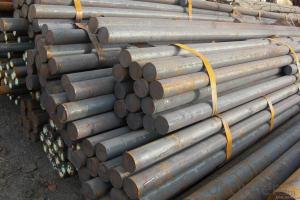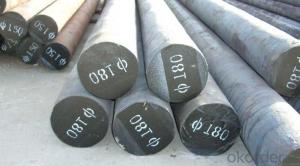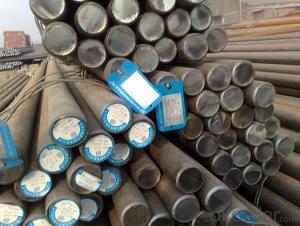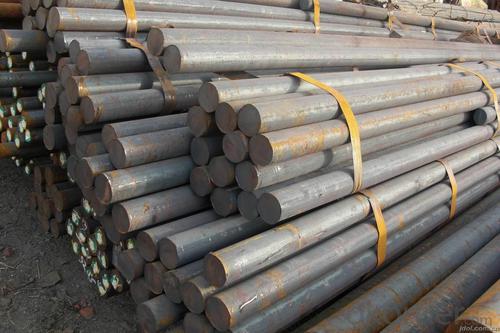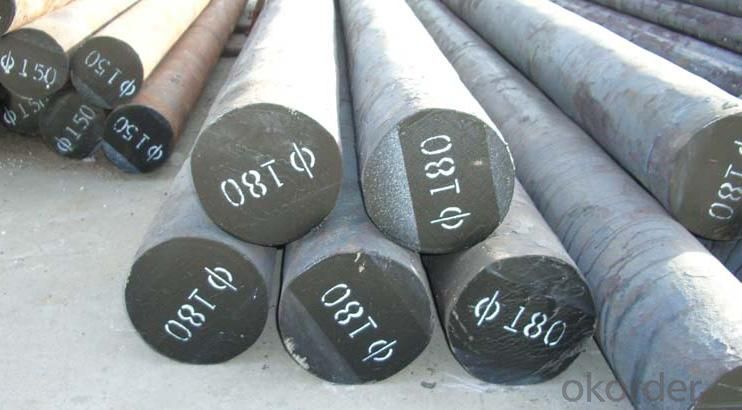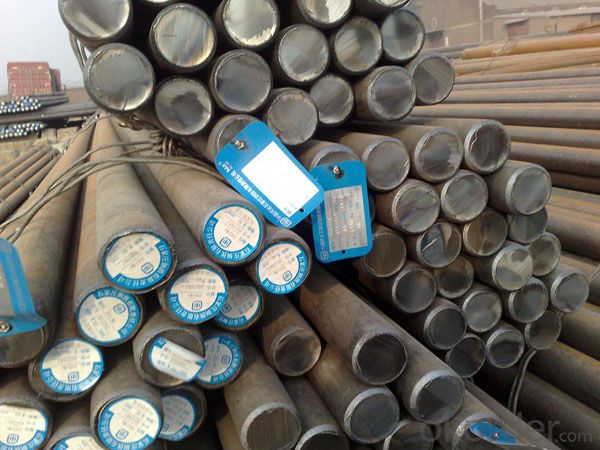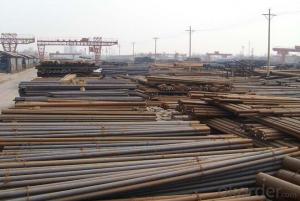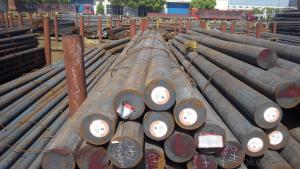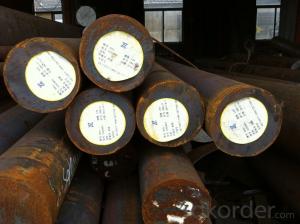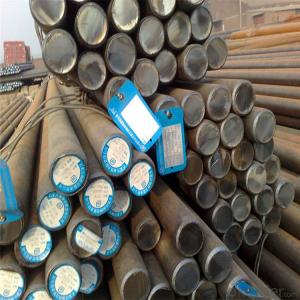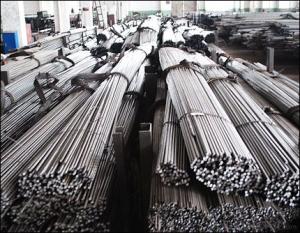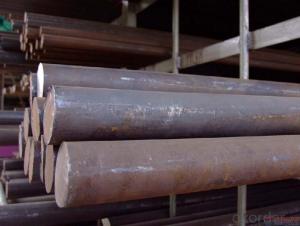High Hardness Carbon Steel S45C CK45 1045
- Loading Port:
- China main port
- Payment Terms:
- TT OR LC
- Min Order Qty:
- 30 m.t.
- Supply Capability:
- 10000 m.t./month
OKorder Service Pledge
OKorder Financial Service
You Might Also Like
Specification
High Hardness Carbon Steel S45C CK45 1045
Product Information:
1. Small quantity, short time delivery
If we have stocks, we can ship from a minimum of 1 kg sample in a few days.
We also manufacture custom-order materials in amounts of 300 kg and up
(Some materials are allowed 50 kg) in as few as 3 weeks.
2. High-precision thickness
We guarantee thickness tolerances that cannot be reproduced by competitors.
Example:
t <0.30mm Tolerance ±1 - 3 μm guaranteed
0.30 mm≤t Tolerance ± 1% guaranteed
3. Ability to add multiple features
We are capable of adding a variety of features to metallic materials
(resin coating, plating, bonding different kinds of metal, multigage skiving, etc.).
4. Unique technology and custom-made solutions
We provide customed solutions to your problems with our unique
technologies and well versed knowledge of materials acquired through
our experience of manufacturing 50,000 items.
5. Choose the appropriate base metals for your needs
We carefully balance quality, delivery time and price,
procure various base metals from all over the world.
We manufacture appropriate products to your needs.
6. To control metal structure(chemical formation)
We can manufacture ultrafine metal structures with a grain size of 1 μm.
Using finer grain sizes provides benefits such as hardenability,
balancing strength and ductility, and precision press processing.
7. Lower total cost
We taking your processing into account,
offer you reduce a total cost by using our product.
8. Global network
Our plant located in Japan, Shanghai and Taiwan,
we also support flexibly local procurement and production transfer.
Product Overviews:
| Product Name | Typical Grades | Diameter(mm) | Standard adopted |
| Carbon Steel | 20 (1020/S20C/C22) | Ø16-Ø300 | GB/SAE/JIS/DIN |
| 40 (1040/S40C/C40) | |||
| 45 (1045/S45C/C45) | |||
| Bearing Steel | GCr9 (51100/SUJ1) | Ø12-Ø250 | |
| GCr15 (52100/SUJ2/100Gr6) | |||
| GCr9SiMn (A485-Gr.1/SUJ3) | |||
| Cr-Mo Steel | 20Cr (5120/SCr420H/20Cr4) | Ø12-Ø250 | |
| 40Cr (5140/SCr440/41Cr4) | |||
| 42CrMo(4140/SCM440/42CrMo4) | |||
| Gear Steel | 20CrNiMo | Ø16-Ø600 | |
| 20CrMn(5115/SMnC420/20MnCr5) | |||
| 20CrNiMo(8620/SNCM220/20CrMiMo2) |
Product Show:

Our Advantages:
· Industry experience over 20 years.
· Shipment of goods -More than 70 countries worldwide.
· The most convenient transport and prompt delivery.
· Competitive price with best service.
· High technical production line with top quality products.
· High reputation based on best quality products.
With our experienced, enthusiastic and dynamic staffs, we assure to bring you the products with best quality, reasonable prices and good after-sales services under the motto: Friends First, Business After.
Communication, Experience, Expertise and Best efforts are our Promises to you.
- Q: How does special steel contribute to the automotive emission reduction?
- Special steel contributes to automotive emission reduction in several ways. Firstly, it is used in the manufacturing of lightweight components, such as the body and chassis, which helps to reduce the overall weight of the vehicle. This, in turn, improves fuel efficiency and reduces emissions. Additionally, special steel can be used to produce more durable and efficient engine parts, such as pistons and crankshafts, which enhance the overall performance of the engine and reduce emissions. Furthermore, special steel is also utilized in the production of exhaust systems, where its high temperature resistance and corrosion resistance properties help to improve the efficiency of catalytic converters, leading to lower emissions of harmful pollutants. Overall, the use of special steel in the automotive industry plays a crucial role in reducing emissions and promoting environmental sustainability.
- Q: What are the main factors affecting the cost of special steel?
- The main factors affecting the cost of special steel include the cost of raw materials, such as iron ore and other alloying elements, as well as energy costs for the production process. Additionally, market demand and supply dynamics, production capacity, labor costs, and transportation expenses also play a significant role in determining the cost of special steel.
- Q: How is special steel used in the production of heat exchangers?
- Special steel, with its unique properties, finds extensive application in the production of heat exchangers. These devices are designed to transfer heat between different mediums, and special steel offers several advantages in this process. To begin with, the thermal conductivity of special steel is exceptional, allowing for efficient heat transfer between fluids. This characteristic is vital for heat exchangers as it enables the rapid and effective exchange of thermal energy. Moreover, special steel exhibits high resistance to corrosion, making it highly suitable for heat exchanger applications. Since heat exchangers often come into contact with corrosive fluids or gases, regular steel may deteriorate over time. However, special steel is specifically engineered to resist corrosion, ensuring the durability and reliability of the heat exchanger. Furthermore, special steel possesses remarkable strength and durability, enabling heat exchangers to withstand high pressures and temperatures. Given that heat exchangers frequently operate in challenging environments, special steel can endure these harsh conditions without compromising its structural integrity. Additionally, special steel offers excellent weldability and formability, simplifying the manufacturing of intricate heat exchanger designs. Its versatility allows for the production of heat exchangers in various shapes and sizes, catering to the specific requirements of different industries. In conclusion, special steel is an ideal material for heat exchanger applications due to its high thermal conductivity, corrosion resistance, strength, durability, weldability, and formability. These properties ensure efficient heat transfer, resistance to corrosion, and the ability to withstand harsh operating conditions.
- Q: What are the factors that determine the cost of special steel?
- The cost of special steel is determined by several factors, including the type and grade of steel, the manufacturing process involved, the quantity and availability of raw materials, market demand and competition, transportation and logistics costs, and any additional customization or special specifications required by the customer.
- Q: How does special steel perform in high-temperature creep?
- Special steel is specifically designed to perform well in high-temperature creep conditions. It possesses superior strength, resistance to deformation, and stability at elevated temperatures, making it highly suitable for applications where prolonged exposure to high temperatures and constant stress is expected. Its unique composition and heat treatment processes enable it to maintain its mechanical properties and resist deformation or failure for extended periods under these extreme conditions.
- Q: How is special steel classified based on its mechanical properties?
- Special steel can be classified based on its mechanical properties by considering factors such as strength, hardness, toughness, and ductility. These properties determine the steel's ability to withstand forces and deformations, making it suitable for specific applications in industries like construction, automotive, and aerospace.
- Q: What is the impact of carburizing on the properties of special steel?
- Carburizing, also known as case hardening, is a heat treatment process that involves introducing carbon into the surface layer of special steel. This process has a significant impact on the properties of the steel, enhancing its hardness, wear resistance, and strength. One of the main effects of carburizing is the formation of a hard outer layer, known as the case, which is rich in carbon. The diffusion of carbon atoms into the steel matrix during carburizing increases the carbon content at the surface, resulting in a higher hardness compared to the core. This hardened case provides excellent resistance against wear, abrasion, and surface fatigue, making it well-suited for applications that require high durability, such as gears, camshafts, and bearings. Additionally, carburizing enhances the strength of the steel, as the increased carbon content improves the material's ability to form martensite, a hard, crystalline structure. This martensitic transformation further contributes to the hardness and strength of the carburized steel, making it suitable for applications that require high load-bearing capacity, such as shafts and axles. Furthermore, carburizing can improve the fatigue resistance of special steel. The hardened case formed during carburizing helps to distribute stress more evenly across the surface, reducing the likelihood of crack initiation and propagation. This increased resistance to fatigue failure makes carburized steel suitable for components subjected to cyclic loading, such as gears and springs. However, it is important to note that carburizing can also have some drawbacks. The increased carbon content at the surface can lead to reduced ductility and toughness, making the material more prone to brittle fracture. To mitigate this issue, it is common to use a lower carbon content steel for the core, ensuring a balance between hardness and toughness. In conclusion, carburizing has a significant impact on the properties of special steel. It enhances hardness, wear resistance, and strength, making it suitable for applications that require durability, high load-bearing capacity, and fatigue resistance. However, the process should be carefully controlled to maintain a balance between hardness and toughness, ensuring the material's overall performance and reliability.
- Q: What are the different casting methods used for special steel?
- There are several different casting methods that are commonly used for special steel, depending on the specific needs and requirements of the application. These methods include investment casting, sand casting, continuous casting, and centrifugal casting. 1. Investment casting: This method involves creating a wax pattern of the desired part, which is then coated with a ceramic shell. The wax is melted out, leaving behind a hollow shell, which is then filled with molten steel. Once the steel has solidified, the ceramic shell is broken away, and the final part is obtained. Investment casting allows for complex shapes and intricate details to be created accurately, making it suitable for producing high-quality and precise special steel components. 2. Sand casting: Sand casting is one of the oldest and most widely used casting methods. It involves creating a mold from a mixture of sand and a binder, typically clay. The mold is formed by packing the sand mixture around a pattern of the desired part. Molten steel is then poured into the mold, filling the cavity, and left to cool and solidify. Sand casting is a versatile and cost-effective method, suitable for producing large and heavy special steel components. 3. Continuous casting: This method is commonly used for producing long steel products, such as bars, rods, and billets. It involves continuously pouring molten steel into a water-cooled mold, which solidifies the outer surface of the steel. The solidified steel is then continuously withdrawn from the bottom of the mold, while more molten steel is poured in from the top. Continuous casting allows for the production of high-quality, defect-free steel with a consistent cross-section. 4. Centrifugal casting: In this method, the mold is rotated at high speeds while molten steel is poured into it. The centrifugal force pushes the molten steel towards the outer walls of the mold, resulting in a dense and compact casting with improved mechanical properties. Centrifugal casting is particularly suitable for producing cylindrical or tubular special steel components, such as pipes and rings. Overall, the choice of casting method for special steel depends on factors such as the complexity of the part, the required quality and accuracy, the size and shape of the component, and the production volume. Each method has its advantages and limitations, and careful consideration is necessary to select the most appropriate casting method for a specific application.
- Q: How does special steel contribute to the manufacturing aftermarket industry?
- Special steel plays a significant role in the manufacturing aftermarket industry by offering enhanced performance, durability, and reliability in the production of various components and equipment. One of the key contributions of special steel is its ability to withstand extreme conditions, such as high temperatures, corrosive environments, or heavy loads. This makes it an ideal material for manufacturing critical parts used in industries like automotive, aerospace, energy, and machinery. In the manufacturing aftermarket industry, special steel is commonly used in the production of replacement parts for machinery or equipment that have become worn out or damaged over time. The use of special steel ensures that these replacement parts possess the necessary strength and resilience to meet the original equipment manufacturer (OEM) specifications. Furthermore, special steel allows for the development of innovative designs and the production of more efficient and lightweight components. This helps in improving the overall performance of the equipment, reducing energy consumption, and enhancing productivity. For example, in the automotive industry, special steel is used to manufacture lightweight engine components, resulting in improved fuel efficiency and reduced emissions. Moreover, the use of special steel in the manufacturing aftermarket industry contributes to the reduction of maintenance and downtime costs. By using high-quality steel, the longevity of the replacement parts is increased, reducing the frequency of repairs or replacements. This leads to a decrease in production downtime and associated costs, as well as improving the overall reliability of the equipment. Additionally, special steel offers a wide range of customization options, enabling manufacturers to tailor the material properties to specific requirements. This flexibility allows for the development of unique solutions and the production of specialized components that meet the demands of various industries. It also enables manufacturers to address specific challenges related to wear resistance, hardness, or toughness, which are crucial factors in the aftermarket industry. In conclusion, special steel contributes significantly to the manufacturing aftermarket industry by providing enhanced performance, durability, and reliability to replacement parts. Its ability to withstand extreme conditions, enable innovative designs, reduce maintenance costs, and offer customization options makes it an indispensable material in the production of components and equipment in various industries.
- Q: How is special steel used in the aerospace supply chain?
- Special steel is used extensively in the aerospace supply chain due to its exceptional strength, durability, and resistance to extreme temperatures. It is utilized in various components such as engines, landing gears, structural frames, and fasteners. The unique properties of special steel enable aircraft to withstand high stress and harsh operating conditions, ensuring safety and reliability in the aerospace industry.
Send your message to us
High Hardness Carbon Steel S45C CK45 1045
- Loading Port:
- China main port
- Payment Terms:
- TT OR LC
- Min Order Qty:
- 30 m.t.
- Supply Capability:
- 10000 m.t./month
OKorder Service Pledge
OKorder Financial Service
Similar products
Hot products
Hot Searches
Related keywords
